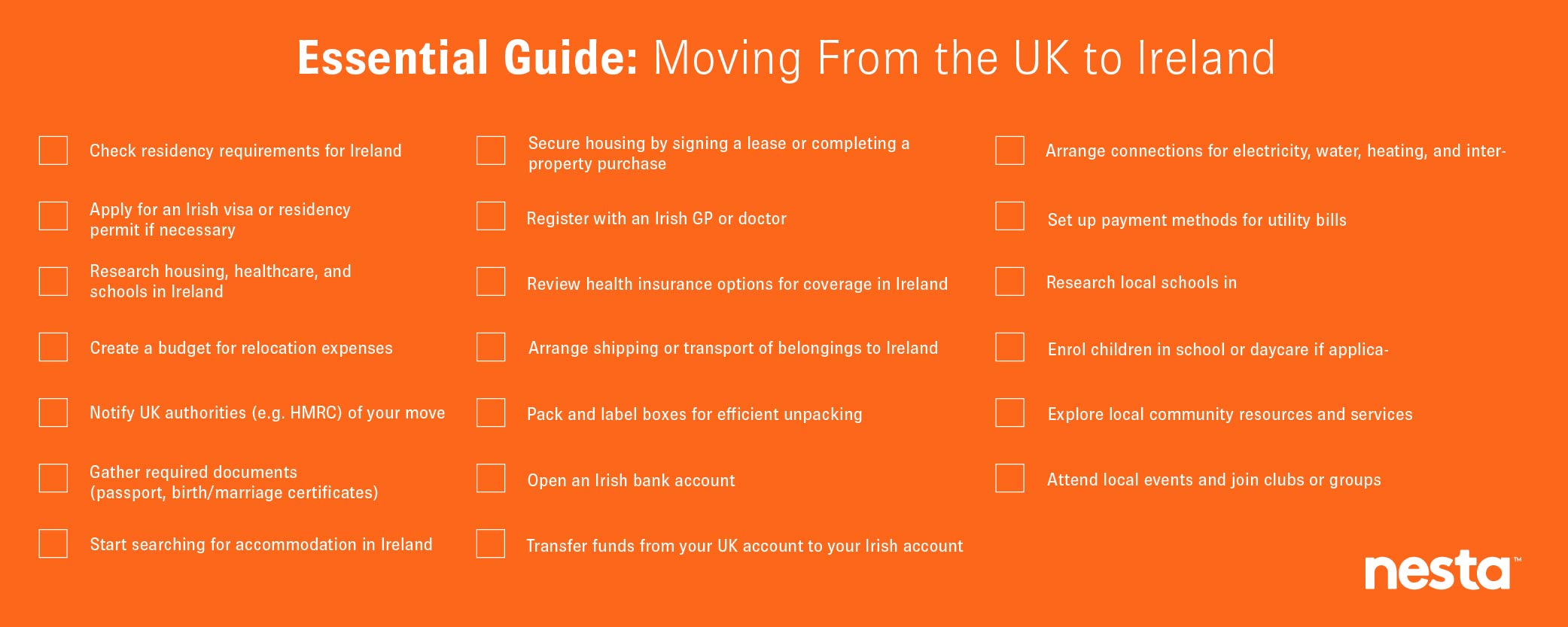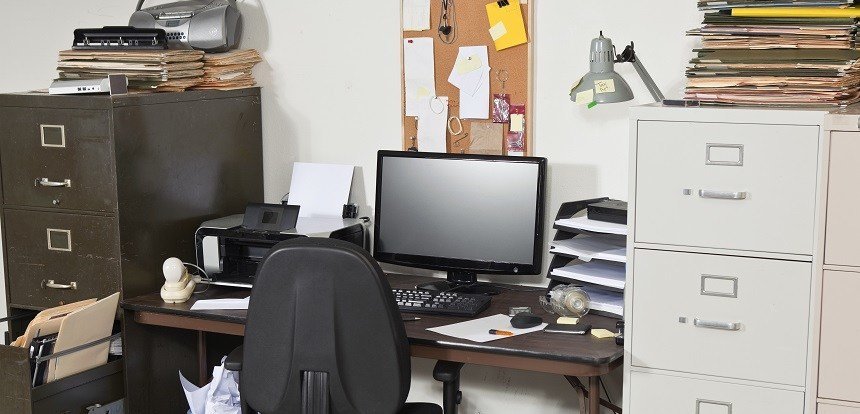The Complete Guide on Moving to Ireland from the UK
Table of Contents
- The Complete Guide on Moving to Ireland from the UK
Moving to Ireland from the UK is a significant life change, which has its own unique set of challenges but also some great opportunities for a new life, where the grass might even be greener.
This comprehensive guide will assist you through every step of this major transition. Whether navigating visa requirements, figuring out healthcare access, or adjusting to the Irish way of life, we’ve got the info you need to know.
Moving to Ireland from the UK After Brexit: What You Need To Know
Understanding the following considerations for UK citizens and non-UK citizens will help facilitate a successful relocation for you and your family.
Visa and Permit Requirements
Since January 2021, British citizens can still enjoy visa-free short-term visits to most EU countries, with stays up to 90 days in any 180-day period. However, living, working, or studying long-term in EU countries now depends on each country’s specific immigration laws.
Ireland is a notable exception. Thanks to the Common Travel Area (CTA) agreement, visa and immigration requirements for British citizens travelling to Ireland (and vice versa) remain unchanged. This allows for unrestricted movement between the UK and Ireland, making emigration relatively straightforward for British citizens.
It’s important to note that these CTA freedoms only apply to Irish and British citizens. Non-Irish or non-British family members will need to follow standard immigration processes.
Work and Study Requirements
UK nationals can work and study in Ireland without special visas under the CTA. Non-UK citizens need specific work permits, such as Critical Skills, General Employment, Intra-Company Transfer, or Working Holiday Authorisation.
For studying, non-UK citizens require either a short-term (C) or long-term (D) study visa, depending on course duration. Student visa requirements include an offer from a recognised Irish institution, proof of financial support, private medical insurance, and intent to return home after studies.
Non-EEA students staying over 90 days must register with the Irish Naturalisation and Immigration Service (INIS).
Always check the latest visa requirements on the official Irish government website before planning your move.
Healthcare Access
When moving to Ireland, understanding how to access healthcare is crucial. The Irish healthcare system operates on a two-tier basis — public and private — and your access depends on your citizenship status and residency.
For UK Citizens
As a UK national living in Ireland, you’re entitled to state healthcare on the same basis as Irish citizens, provided you’re ‘ordinarily resident’ — meaning you’ve lived or intend to live in Ireland for at least a year. You can access state health services but be prepared to pay fees for some services. The cost depends on your circumstances.
If you’re ordinarily resident, you can access the Irish healthcare system by either paying standard patient charges or with a medical card. Some individuals paying charges may also qualify for a GP visit card, allowing free GP services.
For those temporarily in Ireland (e.g. students or posted workers) who normally reside in the UK, you may be eligible for necessary healthcare funded by the UK.
For Non-UK Citizens
If you’re from outside the UK, your access to healthcare depends on your residency status and country of origin. To use public healthcare services, you need to establish that you are ordinarily resident.
Once considered ordinarily resident, you may qualify for full (medical card) or limited eligibility for public health services, based on your income and personal circumstances. If you’re employed in Ireland and paying social insurance contributions (PRSI), you’re entitled to public healthcare services, though some fees may apply.
EU/EEA and Swiss citizens can use their European Health Insurance Card (EHIC) for necessary healthcare during temporary stays, but this isn’t a long-term solution. Non-EU citizens typically need private health insurance as a visa condition.
Regardless of your origin, it’s advisable to register with a local General Practitioner (GP) once settled.
Financial Planning
Financial planning is a crucial step when moving from the UK to Ireland. As you prepare for this transition, there are several key areas to consider.
- Consider the Currency Change From Pounds to Euros: Research the best methods for currency exchange and consider options like international bank accounts or specialised transfer services to get favourable rates.
- Set Up an Irish Bank Account: This should also be a priority. Some UK banks have partnerships with Irish institutions, which can streamline this process.
- Understanding the Irish Tax System is Essential: Ireland’s tax year runs from January to December, unlike the UK’s April to April cycle. Initially, you may face tax liabilities in both countries, but a double taxation agreement is in place to prevent paying twice.
- Review Your Pension Situation: If you have a UK pension, investigate how it will be affected by your move and explore options such as transferring it to an Irish scheme or leaving it in the UK.
- Consider the Implications of Property Transactions: If you’re selling property in the UK, be aware of potential capital gains tax. For those looking to buy in Ireland, research the local property market and mortgage processes.
- Review your investments: Some UK-based options may need restructuring.
- Have an Emergency Fund: This is to cover unexpected costs during your transition.
Given the complexity of international moves, it’s advisable to seek guidance from a financial advisor who is familiar with both UK and Irish systems. They can provide tailored advice for your specific situation. Remember, financial regulations and agreements can change, so always verify the most current information from official sources when planning your move.
The Costs of Relocating to Ireland
Budgeting for Your Move, From Shipping to Housing
When considering the cost of moving from the UK to Ireland, several key factors come into play:
- Shipping Costs: Estimate expenses for transporting your belongings. Costs vary based on volume, shipping method (sea or air freight), and distance. For a typical household move for a three-bedroom, expect to pay between €1,500 to €3,000.
- Housing Deposits: For rentals, deposits usually equal one month’s rent. For property purchases, expect to pay a deposit of 10% of the property’s value. In Dublin, the average monthly rent for a one-bedroom apartment starts at around €1,300.
- Utility Connections: Budget for essentials such as electricity, gas, and TV/internet setup. Initial connection fees can range from €50 to €200 per utility. Monthly costs vary but budget around €150–€200 for a small apartment.
- Insurance: Home insurance in Ireland averages €430 annually. Contents insurance during transit is advisable and can cost €100–€300 depending on value.
- Miscellaneous Expenses: Set aside about €1,000–€2,000 for initial setup costs like temporary accommodation, first grocery shop, and local transportation.
- Import Duties: Thanks to the UK-EU Trade and Cooperation Agreement, most personal belongings are exempt from customs duties when moving to Ireland. However, certain items like new furniture or vehicles may be subject to VAT.
It’s crucial to research current prices and regulations, as costs can vary significantly depending on your specific circumstances and location within Ireland. Planning thoroughly will help create a realistic budget for your relocation from the UK to Ireland.
Note: These costs can fluctuate significantly depending on specific circumstances like location and time of year.
Benefits of Moving to Ireland From the UK
Moving to Ireland can enhance your quality of life with its affordable living costs, excellent healthcare and education systems, career opportunities, and a balanced lifestyle that values both work and leisure. These factors make Ireland an attractive destination for those seeking a fulfilling and enriching experience abroad.
- Cultural Familiarity: Ireland shares many cultural similarities with the UK, making the transition easier for many Brits. That said, there are many delightful aspects of Irish culture that you can look forward to learning about as a Brit!
- English-Speaking Environment: As English is widely spoken, language barriers are minimal for most UK citizens.
- Scenic Landscapes: Ireland is renowned for its stunning natural beauty, from rugged coastlines to rolling green hills.
- Quality of Life: Many areas in Ireland, especially outside Dublin, offer a slower pace of life and a strong sense of community.
- Education System: Ireland boasts a high-quality education system, with several world-ranked universities, like the renowned Trinity College Dublin.
- Rich Cultural Heritage: Ireland offers a wealth of history, literature, music, and arts to explore.
- Work Opportunities: Dublin, Cork, and other Irish cities have thriving industries in technology, pharmaceuticals, finance, and more. The country’s economic growth and business-friendly environment attract international companies, offering diverse employment prospects.
Step-by-Step Guide: How To Move From the UK to Ireland
- Check residency requirements for Ireland
- Apply for an Irish visa or residency permit if necessary
- Research housing, healthcare, and schools in Ireland
- Create a budget for relocation expenses
- Notify UK authorities (e.g. HMRC) of your move
- Gather required documents (passport, birth/marriage certificates)
- Start searching for accommodation in Ireland
- Secure housing by signing a lease or completing a property purchase
- Register with an Irish GP or doctor
- Review health insurance options for coverage in Ireland
- Arrange shipping or transport of belongings to Ireland
- Pack and label boxes for efficient unpacking
- Open an Irish bank account
- Transfer funds from your UK account to your Irish account
- Arrange connections for electricity, water, heating, and internet
- Set up payment methods for utility bills
- Research local schools in Ireland
- Enrol children in school or daycare if applicable
- Explore local community resources and services
- Attend local events and join clubs or groups
This checklist will help you stay organised and make sure you complete all necessary steps for a smooth move from the UK to Ireland. Adjust the checklist based on your specific circumstances and needs.
Click here for our list of moving house tips if you need some help with your move!
Let Nesta Help You With Your Move
At Nesta, we understand the challenges of moving and offer reliable self storage to simplify your relocation process. From short-term storage solutions to secure long-term options, our facilities cater to your needs.
Explore our services today and let Nesta be your partner in making your move to Ireland as smooth and stress-free as possible. Get a free quote now!
Table of Contents
- The Complete Guide on Moving to Ireland from the UK
Related Posts
- January 22, 2026|1 min read
- December 22, 2025|1 min read
- May 19, 2025|1 min read











